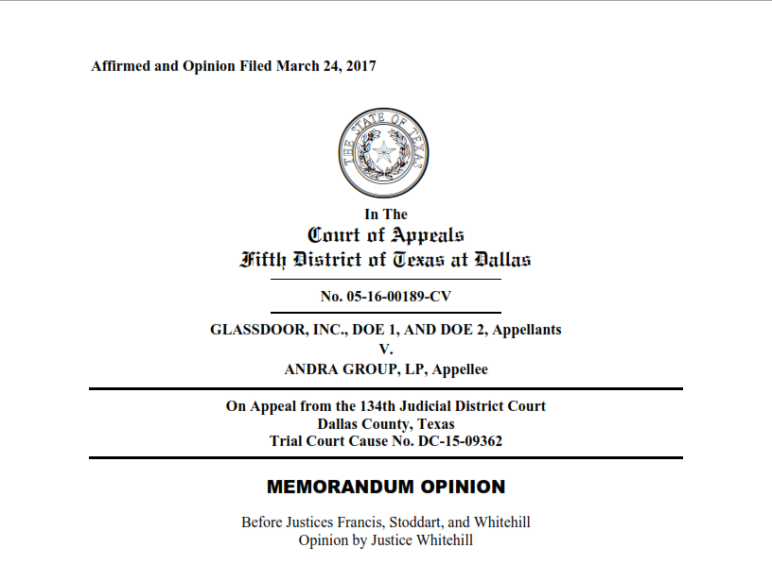The United States has long held close to its heart the right for authors to speak anonymously. However, protecting an anonymous author is getting more and more difficult these days. The March 24, 2017 ruling by the Appellate Court for the Fifth District of Texas in Glassdoor, Inc., et al. v. Andra Group, LP certainly didn’t help either.
In my practice I see volumes of subpoenas sent to websites holding third-party anonymous content requesting the anonymous author’s identifying information. Most of the time Plaintiffs file a John or Jane Doe defamation related litigation, which preserves the statute of limitations, and then they conduct limited discovery in order to ascertain who the proper defendants are and move forward from that point. Typically, most states have some sort of notice requirement to the anonymous author that would provide them the opportunity to appear and defend their right to remain anonymous. In the state of Arizona we have the controlling case of Mobilisa v. Doe, 217 Ariz. 103, 114-15, 170 P.3d 712, 723-24 (App. 2007). It’s common for websites to raise objections on behalf of an anonymous author when the appropriate basic standards have not been met and, as I recently discussed in another article regarding Glassdoor, courts are ruling that websites like Glassdoor have the standing for the same. This process, including giving author notice in a reasonable way, has always seemed fair to me.
Unfortunately, there seems to be a loophole that many Plaintiffs are taking advantage of, and it can be problematic for anonymous authors and websites alike. I think that pre-litigation discovery tools (Illinois Rule 224, Texas Rule 202, etc.) are being abused in cases dealing with anonymous authors. While I firmly believe that purposeful defamers and harassers should have the book thrown at them (i.e., fines, community service and/or educational requirements), often times the burdens on the plaintiff are not that high, it may not require notice to the author, and once an anonymous author’s information is revealed you can’t un-ring that bell. I believe that pre-litigation discovery tools need either a very high threshold, have a notice requirements like that of Mobilisa or, alternatively, be barred in cases where a party is utilizing it to seek anonymous author information.
In this case Andra filed a Rule 202 petition against Glassdoor seeking to discover the anonymous reviewers’ identities relating to some ten (10) allegedly defamatory postings made about it. Glassdoor, along with two (2) of the anonymous authors, filed an anti-SLAPP dismissal motion. The trial court denied the motion and granted in part the Rule 202 petition which basically allowed Plaintiff to take the deposition of Glassdoor (even though claims against Glassdoor were not anticipated) regarding two (2) of the anonymous postings, not written by Glassdoor nor either Doe 1 or Doe 2, and was going to limit the deposition to five specific statements within those reviews. Glassdoor and the anonymous authors understandably appealed the trial court’s ruling.
The Appellate court then skipped over the whole concept of anonymous free speech when it justified the trial court’s order by stating that “[k]nowing the reviews’ contents alone did not tell Andra [plaintiff] whether it had viable claims against the anonymous reviewers” and that “Andra also needed to know not only the reviewers’ relationships with Andra to evaluate potential defensive issues such as substantial truth.” See Memorandum, p. 7. Yeah, you read that right. The balancing test on pages 8-10 are equally problematic and even through the trial court limited the deposition of Glassdoor to a handful of statements the author(s) of the selected statements still didn’t necessarily have notice nor necessarily the opportunity to appear and defend. Even more troubling is the statement by the Court “[b]ut Rule 202 does not require a petitioner investigating a potential claim to show a probable right in relief on the merits.” See Id, pg. 12. Say what? So a Rule 202 petition can be a BS fishing expedition, not give notice to an author of the BS fishing expedition, require a website to extend time and resources to sit for a BS fishing expedition and/or raise all defenses that may otherwise lie with the knowledge of an author, and that is all okay? Who made up this batch of Koolaid? How can the Court not see how this is paving the highway for abuse by plaintiffs?
You can review the entire Memorandum Opinion here:
.Until next time friends…
All information contained in this blog (www.beebelawpllc.blog.com) is meant to be for general informational purposes only and should not be misconstrued as legal advice or relied upon. All legal questions should be directed to a licensed attorney in your jurisdiction.

